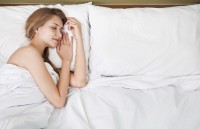
10 Tips to Getting a Healthy Night’s Sleep
So, rather than toss and turn the night away, winding up exhausted and depleted in the morning, what can you do to reverse this cycle? Here are 10 tips to getting a healthy night’s sleep:
- Quantity counts. Strive to get seven to nine hours of sleep each night. No short-cutting or boasting that you can get by on four hours or less. Most adults require at least seven hours of sleep each night for optimal health and productivity. According to the CDC, less than six hours of sleep is linked with chronic diseases, including coronary heart disease, anxiety, obesity and diabetes. The best way to get more sleep is to set a regular bedtime. Make it early enough so you get the right amount of sleep.
- Quality counts too. Just being prone in bed isn’t enough. You need solid sleep, deep REM, allowing your body to rest, renew and rejuvenate. Anything that detracts from sleep should be avoided: no watching TV, no loud noises. Watch the temperature in your room so it’s not too hot or too cold.
- Skip late-evening heavy meals. Eating a heavy meal late in the evening is a sure-fire way to have a poor night’s sleep. Feeling too full, listening to your stomach struggle with digestion for hours, and risking an upset stomach are more than just unpleasant side effects of eating too much too late in the day. A good rule of thumb is to consume your last meal of the day before 6 p.m. Give your body a good 3-4 hours to digest the meal before bedtime.
- Watch out for alcohol, caffeine and some medications. These substances can negatively impact how well you’re able to sleep. That after-dinner espresso might leave you jittery and unable to fall asleep or stay asleep through the night. Ditto certain medications that can upset your stomach, make your heart race or otherwise leave you feeling restless.
- Ensure consistent sleep-wake timing. The best sleep for the human body is at night. When it’s dark, the body naturally wants to shut down and rest. Going to sleep at night and keeping a regular routine is your best strategy. This means going to bed at the same time each night and waking at the same hour each morning.
- Get help for health problems. You may have a physical condition that’s causing problems. As many as 12 to 18 million adults in the U.S. have obstructive sleep apnea (OSA), a dangerous and potentially life-threatening disease. OSA episodes involve complete or partial obstruction of the airway during sleep. If you can’t stop snoring, you might be at risk for OSA. Get it checked out by your doctor, since this is a treatable condition.
- Don’t force it. Say you’ve been in bed and unable to sleep for 15 minutes. Instead of forcing it, trying to will yourself to sleep, get out of bed and do some relaxing activity until you feel sleepy. This may be reading a good book, listening to your favorite music or meditating. When you feel sleepy, return to bed.
- Increase natural light exposure during the day. Be sure to get as much bright natural light exposure during the day so that your body is programmed to want to go to sleep at night. Melatonin is a naturally occurring hormone that’s controlled by light exposure and helps regulate the sleep-wake cycle. During winter days when daylight is limited, a light therapy box can simulate sunshine.
- Get help for mental health issues. Suffering with anxiety, depression or PTSD can impair healthy sleep. You may benefit from cognitive-behavioral therapy or other therapy provided by a licensed medical professional. Those recovering from trauma may wish to consider Eye Movement Desensitization and Reprocessing (EMDR).
Bottom line: take steps now to regulate your sleep patterns, get a good seven to nine hours of sleep every night, and improve your overall health.
